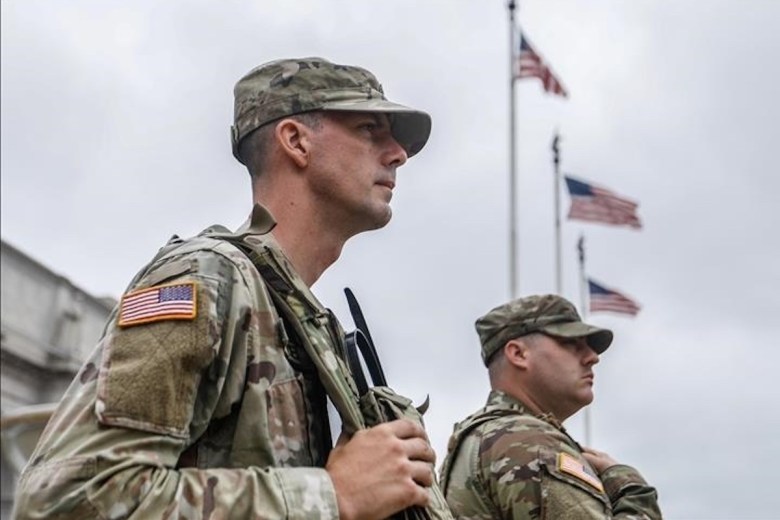Politics
US Military Involvement in Gaza Faces Growing Scrutiny

As the conflict in Gaza intensifies, calls for direct military involvement from the United States are amplifying. Currently, around 200 US troops have been deployed to Israel to oversee a ceasefire agreement, primarily focusing on logistics and security. These troops will operate from a civil-military coordination center in Israel. However, many policymakers are urging caution, questioning the strategic interests that would justify further American military engagement in Gaza.
Examining the Rationale for Intervention
The arguments for US intervention often hinge on humanitarian concerns and regional stability. While these reasons resonate emotionally, they falter under scrutiny. Historically, the United States has refrained from military intervention in numerous humanitarian crises worldwide. If humanitarianism were the cornerstone of American foreign policy, military forces would be in constant deployment. Instead, the actual determinants of US military action have frequently been more complex.
Critics warn that the current situation reflects a familiar pattern of mission creep. Initial involvement often starts with military advisors and intelligence operations, gradually escalating to air support and, ultimately, ground troops in combat roles. This sequence of events has been observed in past interventions, such as those in Vietnam, Iraq, and Afghanistan, where limited objectives evolved into prolonged commitments with ambiguous endpoints and rising casualties.
The Limits of Military Power
The Gaza conflict is deeply entrenched in issues that military force cannot resolve, including Palestinian statehood, Israeli security concerns, and historical claims. These matters require political and diplomatic solutions, not military interventions, which can complicate negotiations and exacerbate existing tensions.
Moreover, direct US involvement could alter the conflict’s dynamics in perilous ways. It risks framing the struggle as a confrontation between the United States and Palestinian or broader Arab interests, rather than a regional dispute. This shift could widen the conflict and create new narratives for extremist groups to exploit, making US soldiers targets for local actors and possibly Iranian-backed militias.
The allocation of resources also presents a critical concern. With finite American military and financial assets, each dollar spent and each soldier deployed in Gaza represents a diversion from other pressing global challenges. At a time when competition with China is cited as a primary strategic focus, entangling US forces in Gaza raises significant questions about prioritization.
The underlying reality is that the United States cannot resolve the Gaza conflict through military means. The involvement would likely drain resources, incur casualties, and alienate allies, all while diminishing American influence in a situation ultimately determined by local and regional stakeholders.
Pursuing Diplomacy Over Military Action
For policymakers genuinely interested in achieving stability in the Middle East, a commitment to diplomacy is essential. This involves supporting ceasefire negotiations, facilitating humanitarian aid, and empowering regional powers to pursue their political solutions. Although this approach may lack the immediate appeal of military intervention, it offers a more prudent path forward.
While history suggests a tendency for Washington to overlook these diplomatic avenues, the urgency for restraint cannot be overstated. Before deploying additional American forces to Gaza, decision-makers must critically evaluate whether they are entering the conflict with clear strategic objectives, realistic timelines, and exit strategies, or if they are inadvertently stepping into another prolonged engagement.
In light of these considerations, the call for restraint—regardless of its current unpopularity—remains the most judicious course of action. As the situation evolves, the focus should remain on fostering peaceful resolutions rather than escalating military commitments that could lead to further entanglements.
-

 Business5 months ago
Business5 months agoKenvue Dismisses CEO Thibaut Mongon as Strategic Review Advances
-

 Lifestyle4 months ago
Lifestyle4 months agoHumanism Camp Engages 250 Youths in Summer Fest 2025
-

 Sports4 months ago
Sports4 months agoDe Minaur Triumphs at Washington Open After Thrilling Comeback
-

 Sports5 months ago
Sports5 months agoTupou and Daugunu Join First Nations Squad for Lions Clash
-

 Top Stories5 months ago
Top Stories5 months agoColombian Senator Miguel Uribe Shows Signs of Recovery After Attack
-

 World5 months ago
World5 months agoASEAN Gears Up for Historic Joint Meeting of Foreign and Economic Ministers
-

 Health4 months ago
Health4 months agoNew Study Challenges Assumptions About Aging and Inflammation
-

 Business5 months ago
Business5 months agoOil Prices Surge Following New EU Sanctions on Russia
-

 Entertainment4 months ago
Entertainment4 months agoDetaşe-Sabah Violin Ensemble Captivates at Gabala Music Festival
-

 Entertainment4 months ago
Entertainment4 months agoBaku Metro Extends Hours for Justin Timberlake Concert
-

 Top Stories5 months ago
Top Stories5 months agoRethinking Singapore’s F&B Regulations Amid Business Closures
-

 Business5 months ago
Business5 months agoU.S. House Approves Stablecoin Bill, Sends to Trump for Signature









